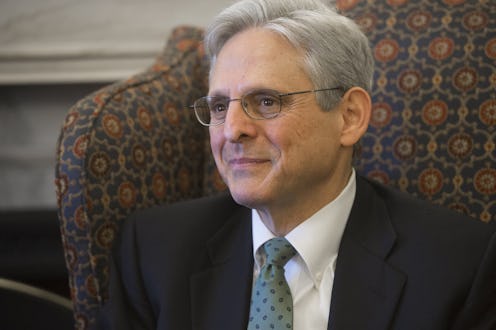News
Garland's Daughter Has Worked On Prison Reform
As all three branches of government gear up for the impending fight over the vacant seat on the Supreme Court, all eyes are on Merrick Garland, President Obama's nominee to fill the seat. Some on the left have been skeptical of Garland due to his conservative record (or merely his not-very-liberal record, depending on who you ask) on criminal justice issues. Interestingly, though, Merrick Garland's daughter has worked on prison reform and related issues for quite a while, which puts her in good company with the Piper (the real-life version) from Orange Is The New Black.
Jessica Garland became involved prison reform work during her freshman year at Yale, when she joined a group called the Manson Prison Education Initiative. This was a group that that tutored incarcerated adolescents at a nearby youth prison in order to prepare them for their GEDs; the idea was to reduce the risk of recidivism by helping ensure that recently-released prisoners had options other than returning to crime. That group eventually evolved into the Yale Undergraduate Prison Project, an organization that aims to "reduce recidivism and promote dialogue around issues connected to mass incarceration."
Garland became the co-president of YUPP, and in 2013, she testified in front of the Connecticut legislature in support of HB 5221, a bill that would have banned life sentences without parole for juvenile offenders. In advocating for the bill, Garland and another YUPP member noted that "juvenile brains are underdeveloped and prone to more impulsive thinking," and that "black and Hispanic juvenile offenders are given far harsher sentences than white juvenile offenders." A version of that bill became law in 2015.
Expanding the rights of juvenile convicts is, broadly speaking, a liberal position on criminal justice reform, and that puts Jessica somewhat at odds with her father. If the Senate confirms the elder Garland's nomination to the Supreme Court — and all signs are that it will not — he'll potentially be in the position to weigh in on similar issues that his daughter has tackled, and it's not at all clear that he'll be as liberal as she is.
Merrick Garland's judicial philosophy on criminal justice has been characterized variously as "moderate-to-conservative," "a true conservative," and "to the right of Scalia." SCOTUSblog noted in 2010 that, in cases regarding the rights of defendants, Garland rarely sides with the defendant. Generally speaking, he's more likely to rule on the side of the government, and according to UC Hastings law professor Evan Lee, Garland is unlikely to "recogniz[e] a bold, new right for criminal defendants based on the original intent of the framers."
Of course, it's impossible to say with any certainty how a potential SCOTUS nominee might rule in the future. But at least on this one issue, there seems as though there could be a schism between the two generations of Garlands.
